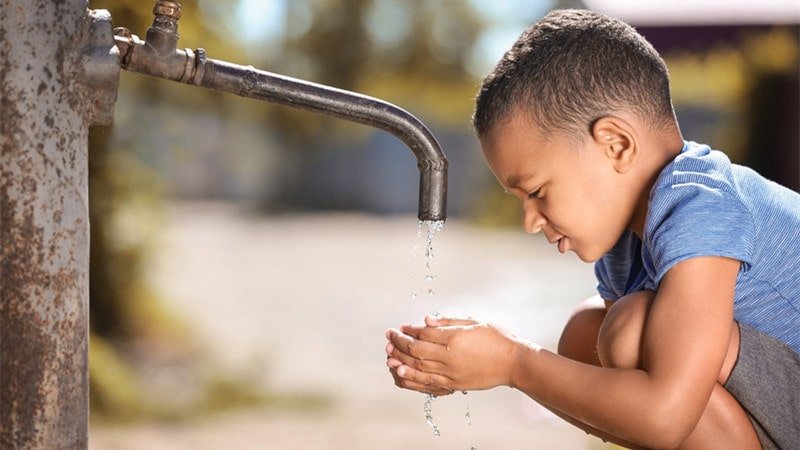Waterborne diseases are most common in developing countries without access to safe drinking water. However, in developed countries such as the United States, water pollution in towns and cities has created a public health crisis.
Collectively, this crisis affects hundreds of millions of people every year.
What is considered contaminated water?
as suggested legal networkContaminated water refers to water containing any radioactive, biological, chemical or physical substances other than water.
This means that the definition is both vague and clear, since anything in the water other than water molecules means it is polluted, but you can expect minor contamination without harming your health.
The amount of contamination that is allowed before it becomes a risk varies. It depends on the type of pollution and the extent of damage it can cause.
Types of damage and diseases caused by contaminated water
typhoid fever
Typhoid fever is an extremely common bacterial disease that usually occurs in less developed countries than industrialized ones. Children are most at risk from the disease due to symptoms of diarrhea and high fever.
Children’s bodies often have difficulty regulating their temperature, and as a result they develop severe diarrhoea.
A vaccine for the disease is available, and people traveling to underdeveloped countries are generally advised to avoid infection.
Early symptoms:
- fever
- Muscle ache
- fatigue
- loss of appetite
- dry cough
- rash
- stomach bloating
- constipation or diarrhea
- stomachache
Later symptoms:
- Puzzled
- extremely tired
This disease can be life-threatening, and if you suspect someone has it, you should see a doctor right away.
cholera
Cholera is a disease that has been all but wiped out, but the bacterial disease still exists in Haiti, Southeast Asia and Africa.
The risk of cholera is higher in countries affected by natural disasters, poverty or overcrowding. While standing or stagnant water can breed cholera, the disease can also spread through seafood, raw vegetables, and room-temperature grains.
That’s why when visiting countries with a risk of cholera, you should make sure all food is cooked and water is bottled.
Early symptoms of cholera are:
- dehydration
- lose weight
- diarrhea
- Vomit.
Later symptoms include:
- fatigue
- sunken eyes
- irritability
- shriveled skin
- little or no ability to urinate
- muscle cramps
Giardia
Unlike the other diseases we’ve already mentioned, giardia is a common disease no matter what country you’re from. It breeds in ponds and streams and can be found in swimming pools and our water supply.
This water-borne disease is caused by a parasite and is usually not fatal. Symptoms should subside after a few weeks, however, you can take medication if it gets worse.
There is no vaccine for the disease, but you can reduce your chances of getting giardia infection by washing your hands with soap and drinking only bottled water rather than swallowing pond or swimming pool water.
symptom:
- diarrhea or greasy stools
- gas
- lose weight
- Bloating
- fatigue
If symptoms don’t subside after a week of infection, see your doctor. If you are dehydrated, see your doctor. If your child becomes infected, see a doctor.
dysentery
Although dysentery is associated with the Victorian disease, it still affects about half a million Americans today.
It is usually spread through poor sanitation, as people become infected with the virus by eating food or drinking water contaminated with feces.
An infection is not a disease in itself, but rather a response to a parasite, virus or bacteria. This reaction produces an infection, which leads to disease.
symptom:
- diarrhea
- stomach cramps
- fever
- dehydration
- Vomit
Mild dysentery can be cured with over-the-counter diarrhea medicines, along with rest and drinking plenty of fluids. If the disease persists, stronger drug therapy may be needed.
Escherichia coli (E. coli)
- E. coli is a bacterial disease commonly found in food and water. Drinking water from puddles, ponds, or unsterilized areas can lead to E. coli infections, just as eating undercooked beef can.
symptom:
- diarrhea
- stomach cramps
- Vomit
You should contact your doctor if you have blood in your stool or persistent diarrhea.
summarize
Many diseases can be found in contaminated water, but they all seem to share the same symptoms — diarrhea, vomiting, stomach cramps, dehydration and fever.
The bacteria or infection causing these symptoms can vary, but once you notice these reactions, you know you have a waterborne illness.
If symptoms become severe, enter the advanced stages described above, or do not go away after a week, contact your doctor.
